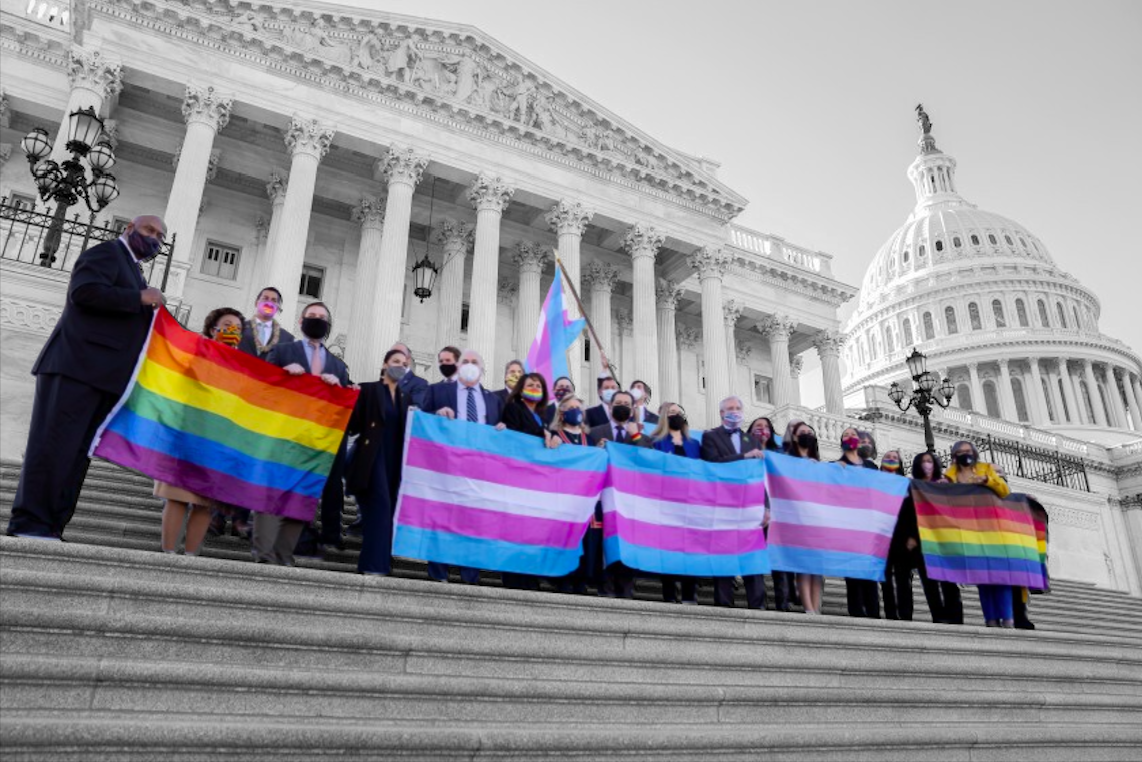What the Equality Act’s Passage Will Do For America
March 2, 2021
The Equality Act was introduced to Congress on March 13, 2019. Up until recently, the bill has not been talked about much. But now, the bill has passed the House unanimously with the Democratic majority, but it will have a harder time in the Senate. To pass in the Senate, it will need 60 votes to avoid a filibuster, though some more moderate Republicans have shown support for the bill.
The bill itself outlines protections for LGBTQ+ individuals by amending the Civil Rights Act of 1964. Last year, the Supreme Court ruled that the act’s discrimination on the basis of sex protections also extend to LGBTQ+ individuals. For example, a woman who was fired because they are married to another woman is facing discrimination, because she would not be fired if she were a man. This interpretation of the act is huge for LGBTQ+ citizens, and is why the Equality Act needs to be passed. This Civil Rights Act may be interpreted this way under the Biden administration and his executive order, but a future administration may not include LGBTQ+ protections in the interpretation. That’s why a measure to extend concrete protections to LGBTQ+ individuals is being voted on.
The Equality Act provides long overdue federal civil rights protections for LGBTQ+ Americans, preventing discrimination in our housing, education, public services, and lending systems. I urge Congress to swiftly pass this historic legislation.
— President Biden (@POTUS) February 19, 2021
“I think the Equality Act should be passed as it will provide vital anti-discrimination protections that are crucial to the advancement of equal rights in America,” said Savannah Armentrout (‘22).
“I think the Equality Act should definitely be passed,” said Sabrina Grayson (’24).
The Equality Act is also introducing other protections aside from one’s covered in the Civil Rights Act. These include federally funded programs, and “public accommodations,” meaning retail stores, stadiums, online retailers, transportation providers, doctors, and more. Other than LGBTQ+ protections for these, it also includes racial and religious protections. The Civil Rights act already protects people on the basis of race, national origin, and in most cases, sex, disability and religion. But there are currently no national protections for LGBTQ+ individuals.
View this post on Instagram
If the Equality Act passes the House and Senate, President Biden will be signing it into law, and providing these protections for the LGBTQ+ population, which is around 5.6% of the US population. This may not sound like a lot of people, but 5.6% of the US population is 18 million people. The Equality Act also has broad support, with support for it being around 70%, comprising all partisan views–including Democrats, Republicans, and Independents alike.
“Personally, yes, I do believe that the Equality Act should be passed because it’s the civil right of those in the LGBTQ+ Community to be protected from discrimination. It is already a problem that people are being judged and often ostracized for their sexual orientation or gender, but the fact that it is even a question about whether or not this bill should be passed is outrageous. To try and deny someone’s natural, human rights is unconstitutional and ridiculous. Because honestly, why does it matter if someone is transgender or gay? The simple answer is, it doesn’t,” said Riley Rubio (’23).
I am immensely proud of my daughter.
Our transgender flag not only represents her but the millions of Americans that deserve not to be bullied or discriminated against by anyone – let alone a sitting member of Congress.
Enough with the hate, let’s pass the #EqualityAct. pic.twitter.com/QKDJuJxz2q
— Congresswoman Marie Newman (@RepMarieNewman) February 25, 2021
Critics of the bill say that the Equality Act infringes on religious freedom, citing how it threatens the lifestyles of people of faith, such as not allowing religious organizations to force employees to live a life in accordance to religious beliefs, not allowing adoption agencies reject qualified LGBTQ+ foster parents looking to adopt, not allowing people of faith to reject LGBTQ+ customers, and forcing people of faith to speak messages that violate their belief under threat of punishment, such as in the situation of a Christian professor who was punished for purposely using a student’s incorrect pronouns.
However, there is the argument that these things don’t infringe religious freedom. For example, using a person’s preferred pronouns is just being respectful, and doesn’t involve religion. Accommodations can also be made for people of other gender identities–such as installing gender neutral bathrooms. There are also a lot of positives that would come from these policies. For example, LGBTQ+ couples are 4 times more likely to adopt kids than straight couples.

